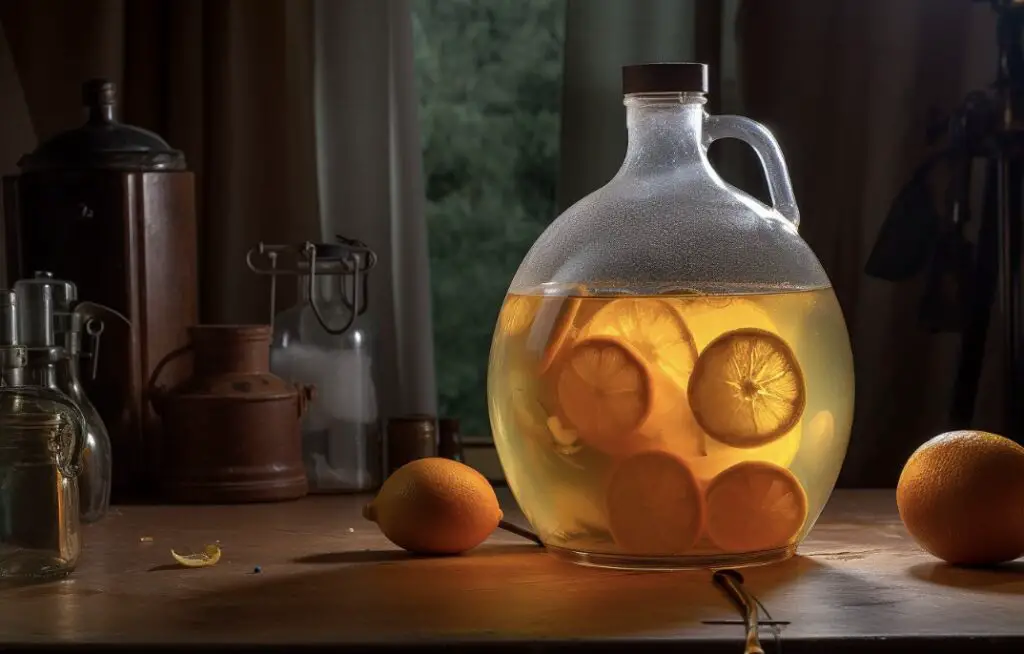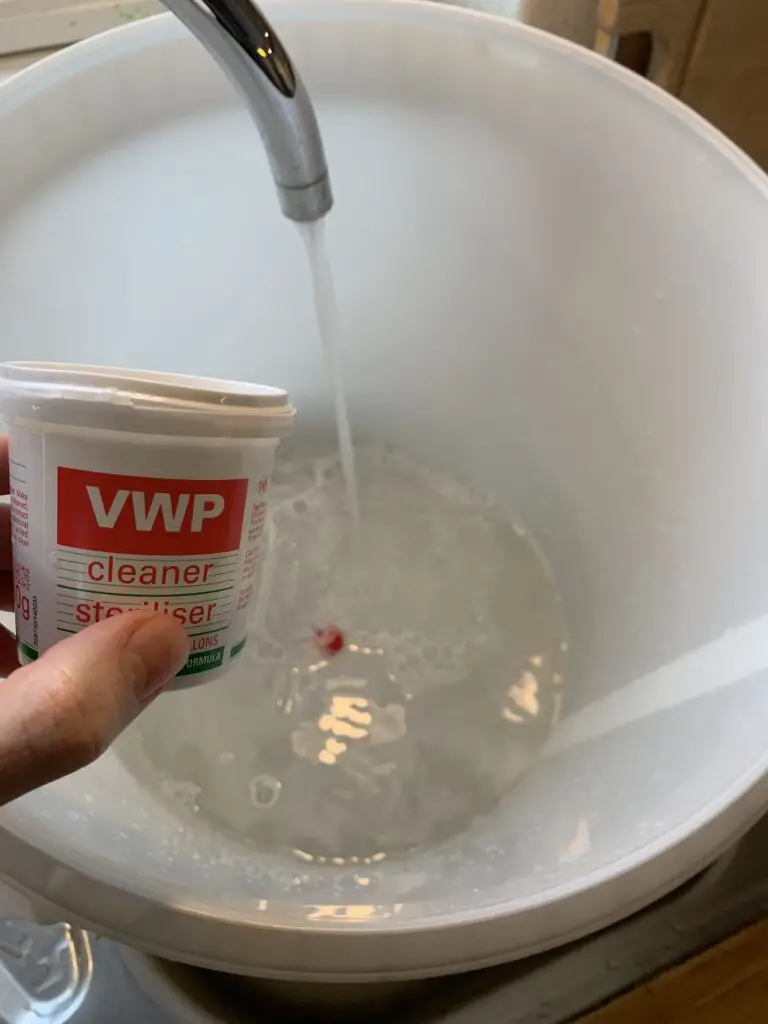Fermentation is the ancient and magical process that we, as brewers, use to transform simple ingredients into delicious and intoxicating beverages. From beer to wine, cider to mead, countless drinks have been created through fermentation.
But what about orange juice? Can you ferment orange juice? And if so, is it any good? Read on to find out.
Yes, you can ferment orange juice, but the end product does not taste good.
While it’s technically possible to ferment orange juice, the resulting drink is likely to be very sour, with off-flavors and a less-than-pleasant aroma.
My First Attempt at Fermenting Orange Juice
The idea of fermenting orange juice piqued my curiosity as a brewer, so I decided to give it a try. I began my experiment with a simple setup: a gallon of store-bought, preservative-free orange juice, a packet of champagne yeast, and a sanitized fermentation vessel with an airlock.
After pouring the orange juice into the fermentation vessel and pitching the yeast, I sealed the container and anxiously awaited the results. The fermentation process seemed to go smoothly; within a few days, I noticed bubbles rising through the airlock, indicating that the yeast was doing its job.
After about two weeks, I decided it was time to taste my creation. With excitement and anticipation, I took a sample and was immediately hit with a wave of disappointment.
The taste was nothing like I had expected it was incredibly sour, with a pungent, almost vomit-like aroma.
My first attempt at fermenting orange juice was a complete failure, but this experience only fueled my curiosity to understand why.
The Science Behind Fermenting Orange Juice
To better understand why my orange juice fermentation experiment had failed so miserably, I delved into the science of fermentation.
Fermentation is a process in which yeast consumes sugar, producing carbon dioxide and alcohol as byproducts. Different strains of yeast have varying tolerances for alcohol content and acidity, which can significantly impact the final product’s flavor profile.

Orange juice is naturally high in sugar and acidity, thanks to the citric acid present in the fruit. While this acidity can be beneficial for some fermentations, it can cause problems in others.
When fermenting orange juice, the high acidity can inhibit yeast growth, leading to a slow, incomplete fermentation. This can result in a drink that is overly sour, with unpleasant off-flavors.
The Role of Yeast in Fermenting Orange Juice
As previously mentioned, the type of yeast used in fermentation can significantly impact the final product. In my initial experiment, I used champagne yeast, which is known for its high alcohol tolerance and clean fermentation profile.
However, this yeast strain may not have been the best choice for fermenting orange juice.
Some brewers have had success using ale yeast strains, such as Safale US-05 or Nottingham, which are better suited to handle the high acidity of orange juice. Others have experimented with wine yeast strains, such as Lalvin EC-1118, which is known for its ability to ferment in high-acidity environments.
Despite the potential for improved results with different yeast strains, it’s essential to keep in mind that the final product may still be far from a delicious, refreshing beverage.
The Effect of Preservatives on Fermentation
Another factor that can impact the fermentation of orange juice is the presence of preservatives. Many store-bought orange juices contain preservatives, such as potassium sorbate or sodium benzoate, which are added to extend the product’s shelf life.
These preservatives can inhibit yeast growth and fermentation, leading to a stalled or incomplete fermentation.
When attempting to ferment orange juice, it’s crucial to use a juice that is free of preservatives. This might involve purchasing a preservative-free juice from the store or juicing fresh oranges at home.
The Importance of Sanitation in Fermenting Orange Juice
As with any fermentation, proper sanitation is essential when attempting to ferment orange juice. Any bacteria or wild yeast present in the fermentation vessel can compete with the desired yeast strain, potentially leading to off-flavors and spoilage.

Before starting the fermentation process, it’s important to thoroughly clean and sanitize all equipment that will come into contact with the juice. This includes the fermentation vessel, airlock, and any sampling or measuring tools.
The Potential for Spoilage and Mold
Even with proper sanitation, the fermentation of orange juice carries a higher risk of spoilage and mold growth compared to other beverages. The high sugar content and acidity of the juice can create a favorable environment for bacteria and mold, leading to a ruined batch.
To minimize this risk, it’s crucial to monitor the fermentation closely and promptly address any signs of spoilage or mold growth. This might involve discarding the batch and starting anew, which can be disheartening but is sometimes necessary to ensure a safe and enjoyable final product.
Alternative Methods for Fermenting Orange Juice
Despite the challenges associated with fermenting orange juice, some brewers have found success using alternative methods.
One approach is to blend the orange juice with a more traditional fermentable base, such as apple juice or a malt extract. This can help to balance the acidity of the orange juice while still providing some of the desired orange flavor.
Another option is to ferment a different fruit juice, such as grape or apple, and then add orange juice or orange zest during secondary fermentation. This can impart some orange flavor to the final product without the challenges associated with fermenting orange juice directly.
The Verdict: Can You Ferment Orange Juice?
In conclusion, while it is technically possible to ferment orange juice, the resulting beverage is unlikely to be enjoyable. The high acidity and sugar content of orange juice can lead to a sour, off-flavored drink with an unpleasant aroma.
However, for those determined to capture the essence of oranges in a fermented beverage, alternative methods such as blending with another fermentable base or adding orange juice during secondary fermentation may provide more satisfactory results.
10 Facts About Fermenting Orange Juice
1. Yes, you can ferment orange juice, but it doesn’t taste good.
2. The high acidity of orange juice can inhibit yeast growth and lead to a sour final product.
3. Different yeast strains, such as ale or wine yeast, may produce better results when fermenting orange juice.
4. Preservatives in store-bought orange juice can prevent fermentation, so using preservative-free juice is essential.
5. Proper sanitation is vital when fermenting orange juice to prevent spoilage and off-flavors.
6. The fermentation of orange juice carries a higher risk of spoilage and mold growth compared to other beverages.
7. Blending orange juice with another fermentable base, such as apple juice or malt extract, can help to balance acidity and improve the final product.
8. Adding orange juice or zest during secondary fermentation of a different fruit juice can impart orange flavor without the challenges of fermenting orange juice directly.
9. Monitoring the fermentation process closely and addressing any signs of spoilage or mold growth is crucial for success.
10. Despite the challenges, some brewers have found success in fermenting orange juice or capturing its essence in alternative ways.
FAQs
What happens if you ferment orange juice?
Fermenting orange juice will convert the natural sugars in the juice into alcohol and carbon dioxide, resulting in a tangy and slightly fizzy beverage known as orange wine or orange cider.
How long does it take for orange to ferment?
It typically takes 3-4 days for orange to ferment. However, the fermentation time can vary depending on the specific recipe and environmental factors such as temperature and humidity.
Is it OK to drink fermented orange juice?
It is not recommended to drink fermented orange juice as it can contain harmful bacteria and toxins that can cause foodborne illness. It is best to discard any fermented or spoiled juice to avoid potential health risks.
What does fermented orange taste like?
Fermented orange can have a tangy, slightly sour taste with a hint of sweetness. The flavor can vary depending on the fermentation process and the specific type of orange used.
Can you ferment orange?
Yes, you can ferment orange. The process involves using a starter culture such as whey or a commercial starter culture to ferment the orange juice. The result is a tangy and slightly effervescent drink known as orange kefir or orange soda. However, it is important to note that fermenting orange juice can increase its sugar content and therefore should be consumed in moderation.
Which fruits ferment the fastest?
Fruits with high sugar content, such as grapes, apples, and berries, tend to ferment the fastest.




